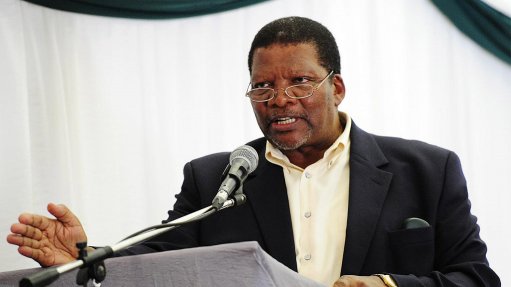
Minister of Water and Sanitation, Gugile Nkwinti
The Minister of Water and Sanitation, Hon. Gugile Nkwinti reiterated government’s commitment for collaborative efforts to lead transformation of the water sector as the department prepares to launch the Phakisa Process for Water and Sanitation. The Process seeks to address sector challenges and ensure that as per the ideals of the NDP, the Master Plan will assist the DWS to achieve the desired outcomes.
Minister Nkwinti was speaking at a Ministerial Interactive Session on the Transformation of the Water Sector, attended by more than 300 sector leaders held on Friday, 15 February 2019 at the Birchwood Hotel in Boksburg.
“My role here today is to actively interact, listen and share ideas on how to move the sector forward. As a department, we are here to facilitate this collaborative transformation process and we can only be successful if we work together, the session is also meant to find input towards the Phakisa Process of the National Water and Sanitation Master Plan, and hear of experiences of the sector on services received”, said Minister Nkwinti.
The interactive session was meant to inform of the current status of transformation in the sector, including what obstacles have impeded transformation to date, how they can be overcome; and create a common vision and approach to move forward with this non-negotiable: transformation in the sector, including the transformation of the remaining Irrigation Boards to Water User Associations (WUAs).
Presenting at the session, Deputy Director-General Trevor Balzer, responsible for Strategic and Emergency Projects, gave an overview of the National Water and Sanitation Master Plan, focusing on how the Master Plan can assist in addressing sector challenges and also the implementation of the Phakisa Process for Water and Sanitation.
“The Phakisa on Water and Sanitation will see sector partners agree on concrete actions, budgets and timeframes necessary to implement the Master Plan, and ensure a water-secure future for the country, while also addressing the triple challenges confronting the country, namely, poverty, unemployment and inequality,” Balzer said.
Balzer said the Phakisa for Water and Sanitation is a game-changer for the department and the sector as a whole. He added that it is the intention of the department to mobilise the sector to undertake the implementation of Phakisa by March 2019.
There were also presentations by SALGA, COGTA, Water Users Associations, a Ministerial Advisor, and Deputy Director-General Anil Singh on policy, legislative and regulatory perspective. The presentations were followed by a robust discussion session with attendees.
Also in attendance was Deputy Minister Andries Nel of the Department of Cooperative Governance and Traditional Affairs (COGTA), as well as MEC for COGTA in KwaZulu-Natal, MEC Nomusa Dube-Ncube.
Deputy Minister (DM) Nel applauded Minister Nkwinti for initiating and leading the session with the water sector, and including COGTA as an interested party, saying this was the right step to foster relations and build trust with sector leaders.
Further in his remarks, DM Nel emphasized that all service delivery required more that the building of new infrastructure. “Maintaining infrastructure is critical, as well as the attraction of private sector investment in the water and local government sectors. The President in delivering the State of the Nation Address (SONA) reminded all of us of the interlocking and complex nature of this sector. We have also as COGTA become aware of the need to refine the delivery models of basic services, and water in particular,” Deputy Minister Nel said.
In his closing remarks, Minister Nkwinti said that: “Today was a day that has been a while in coming. I have never before met the water users even though I have received numerous requests to meet from different sector players. I chose not to meet the individuals but rather to meet the collective. I really appreciate that all of us were able to attend and actually be very active in the session. All of the inputs are accepted and appreciated.
“What I want to emphasise in closing is that for me it is important that the law must be implemented and implemented immediately. This will form an integral part of the way forward towards the desired transformation that we all aspire for,” Minister Nkwinti concluded.
Issued by the Department of Water & Sanitation